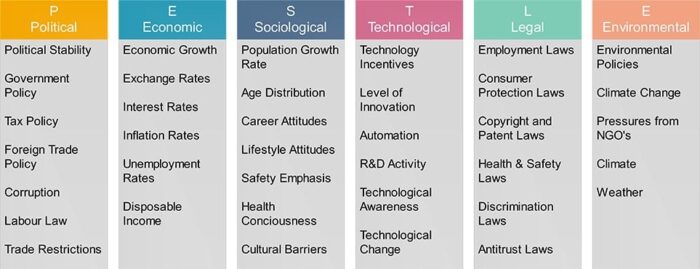PESTLE ANALYSIS
PESTLE strives to explain all the key external factors influencing an organisation and inform decision-making (Rastogi & Trivedi, 2016). PESTLE stands for Political, Economic, Social, Technological, Legal, and Environmental factors in the business platform.

Political Factors
These are global trade agreements and restrictions, tax policies, industry regulations, political policies, and political stability effects on organisations. For instance, Brexit significantly affected U.K. trade, reducing trading relationships between the U.K. and E.U. firms (Moschieri & Blake, 2019). This has reduced output by 4%, exerted pressure on labour and capital flow (McGrath, Palmgren, & Liljedahl, 2019), reduced GDP, and weakened the pound leading to increased cost of import and inflation.
Economic Factors
These factors determine an organisation’s economic growth or decline in consumer spending, labour cost, globalisation, exchange rates, and cost of living.
Social Factors
These are trends associated with work-life balance, consumer taste and buying habits, age distribution, and lifestyle choices.
Technological Factors
Technology innovation impacts organisations concerning products, services, data storage, and security. Technological advancements have positive and negative impacts (CIPD, Using evidence and data to create insight, problem-solve, develop ideas, and measure impact, 2019). For instance, the internet provides a platform for advertising and online selling of products and services and creats database security technology. A shift to Artificial Intelligence leads to unemployment since employees are easily replaced with robots.
Legal Factors
Legislation, health, and safety regulations impact organisations. These regulations are enacted through quotas, tariffs, and taxes on products and services. An example of legislation is IR35, an off-payroll rule that ensures assessments are made on every employee who delivers professional services to determine the Income Tax and National Insurance they are supposed to pay.
Environmental Factors
These are impacts of organisational operations on the environment, like global warming. Research data on this informs organisations on long-term sustainable approaches to ensure a healthy environment. The environment also has impacts on organisations. For example, pandemics like the Covid 19 disrupted supply chains and declined investment and employment. Covid resulted in labour pressure and reduced output as most employees were laid off to reduce the cost of operations. Data analysis methods are useful in finding insights into the data collected by people professionals. The two main techniques are quantitative and qualitative methods.
Interviews
Interviews have open-ended questions that allow deeper engagements between the two people involved, presenting detailed explanations (McGrath, Palmgren, & Liljedahl, 2019). The interviewer can study the respondent’s behavioural aspect to gauge honesty in the information given. The exchange of ideas and experiences encourages a wide range of verifiable data. Interviews can be conducted at individual levels or use focus groups in organisations to provide in-depth explanations and insights on the challenges faced and possible suggestions from the workforce on how to improve on the challenges. The above analysis tool and method effectively help identify risks in industry sectors and possible opportunities that help make informed decisions and plans.





